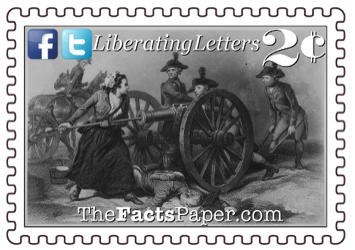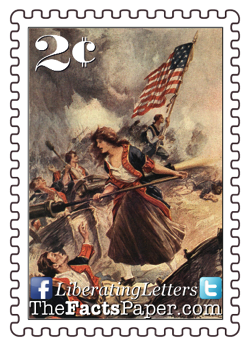Shortly after the battle, the Hayses returned to Carlisle, where they had a child in 1780. Following William’s death in 1786, Mary married another veteran, John McCauley, in 1793. Unfortunately, McCauley squandered Mary’s finances, forcing them to sell the land William received as a veteran. By 1805, McCauley was gone, either by death or divorce. Mary applied for and received a pension in 1822, which she collected until her death on January 22, 1832.
Historically, Mary Ludwig Hays McCauley is considered THE ‘Molly Pitcher’, primarily due to the writings of fellow soldier, Joseph Plumb Martin, who described his remembrances of one particular woman. "A woman whose husband belonged to the artillery and who was then attached to a piece in the engagement, attended with her husband at the piece the whole time. While in the act of reaching a cartridge and having one of her feet as far before the other as she could step, a cannon shot from the enemy passed directly between her legs without doing any other damage than carrying away all the lower part of her petticoat. Looking at it with apparent unconcern, she observed that it was lucky it did not pass a little higher, for in that case it might have carried away something else, and continued her occupation.” Washington reportedly witnessed her valiant efforts, awarding her a commendation. This earned her the nickname “Sergeant Molly” that remained with her the rest of her life.
A year and a half earlier, camp follower Margaret Cochran Corbin took her husband’s place behind a cannon after he was killed defending Fort Washington. (see Captain Molly) Because of this, many believe there is no single Molly Pitcher and that she is a composite of several women. Regardless, we do know that strong, courageous women stood by their men and fought just as heroically and boldly as their husbands.
Liberty, feminists today believe that women before the 1960’s were kept barefoot and pregnant in the kitchen by oppressive husbands. It is no wonder they ignore and suppress stories like Mary Hays and Margaret Corbin. Today’s feminists demand safe spaces, free from conflict, while tweeting their #MeToo moments of a man telling them they look pretty. The Molly Pitchers of the world would have trampled these delegate flowers on their way to loading and blasting off a cannon. It is safe to say, if Revolutionary War soldiers were forced to rely on today’s feminists, we would all still be oppressed under the crushing weight of the crown. However, with their outright devotion to the government, we may still be heading there.
For America to succeed, Liberty, we need Molly Pitchers, not melting snowflakes. Do not be afraid or ashamed to stand by your man, and take up the ramrod if you need to. With God always as your guiding force, pray for strength and wisdom, and then fight with everything you have for liberty and freedom for all.
That’s my 2 cents.
Love,
Mom
June 28, 2018
Dear Liberty,
Mary gathered a few belongings as she headed out. She took one last look at her home before shutting the door, maybe for the last time. As she started down the path, it was with a heavy, but hopeful, heart. She longed to be with her husband, but what would be the cost of that happening?
Following her father’s death in 1769, Mary Ludwig left Trenton, New Jersey, traveling to Carlisle, Pennsylvania, to work as a servant in the home of Anna and Dr. William Irvine. A stanch Patriot, Irvine organized boycotts to oppose the British Tea Acts and other oppressive taxes in 1774, eventually becoming a General in the Continental Army. (see Acts Of Oppression and Tyrants And Tea Parties)
Among those charged with enforcing the boycotts was William Hays, a local barber. As fellow Patriots, William and Mary soon fell in love. In January 1777, Hays enlisted in the 7th Pennsylvania Regiment. Understanding his patriotism, Mary married him, kissed him goodbye, and prayed for a quick reunion. However, by the end of the year, the sturdy woman knew she had the ability to contribute also.
Winter was coming and the Continental Army was low on provisions, men and hope. As soldiers needed help with basics such as cooking, washing and sewing, wives often joined their husbands in the war effort. Known as "camp followers", these women handled the domestic tasks so the men could concentrate on fighting. They were also crucial in caring for the sick and wounded in camp.
As Mary reached the Continental Army camp at Valley Forge, the cold began to sting her face. (see God's Divine Providence and The Man Who Refused To Be King) Once she found her husband, Mary began working with Martha Washington and the other wives already at the camp. It was a hard winter, but together they made it through.
With spring on the horizon, Hays, Mary and the rest were ready to get back in the fight. General George Washington knew he had good men who honestly wanted liberty and freedom. However, their determination only got them so far. They still lacked military discipline and organization. Fortunately, Washington had a solution and it walked into Valley Forge on February 23, 1778.
The previous summer, Baron Friedrich Wilhelm von Steuben, an unemployed officer from the Prussian Army, heard Benjamin Franklin was in France trying to entice the French’s support. Steuben visited Franklin, who immediately recognized his military strengths and informed Washington of such in a letter. With advanced travel funding from the General, Steuben set out for America, arriving at her shores in December.
Since losing Philadelphia to the British in September of 1777, Congress conducted business in York, Pennsylvania. (see Pivot Points) It is here Steuben stood before them on February 5. He presented the delegates with an introductory letter from Franklin, announcing "His Excellency, Lieutenant General von Steuben, Apostle of Frederick the Great." Impressed with his credentials, and desperately needing experienced help, Congress was eager to make an agreement with Steuben. However, they were also seriously lacking funds. Therefore, they proposed paying Steuben once the war was won due to his contributions. Steuben agreed and was instructed to report to Washington at Valley Forge.
Steuben immediately got to work inspecting the men and their situation. Disappointed by the conditions and lack of supplies, he was otherwise impressed by their spirit. Commenting, "No European army could have held together in such circumstances,” Steuben was determined to give these men the tools they needed to win.
A gunner, Hays began his training under Steuben with Mary, otherwise known as Molly, now at his side. In constant need of water to clean and cool their cannons, the men called “Molly! Pitcher!” when they needed a refill. Over time, Mary became known simply as Molly Pitcher.
While the Patriots trained, Franklin finally convinced the French to send assistance. Ships headed to the colonies in early 1778, which prompted action from Great Britain, who instructed General Sir Henry Clinton to send troops to West Florida and the West Indies. With limited forces, he decided to abandon Philadelphia so those men could better defend New York. (see Let Liberty Ring! and A Tale Of Two Patriots) As word reached Washington of their move, he decided it was time to strike.
Washington originally wanted an all out attack on the British caravan consisting of 12,000 troops and a 12-mile baggage train. He summoned his officers to discuss the opportunity. Generals “Mad” Anthony Wayne and Nathanael Greene supported a smaller attack while Generals Charles Lee and Henry Knox wanted to wait on the French. (see How the North Was Won, Morgan’s Miracle, Pivot Points, and The Bookstore General) Weighing all options, Washington realized they may not be able to stop the British, but he could make their journey miserable. It was decided they would attack the British in the rear, disrupting their march.
Organizing his troops, Washington offered the command of 4,000 to Lee, who declined. Therefore, it was given to Marquis de Lafayette. (see Hero Of Two Worlds: The American Years) However, Lee changed his mind once the troops increased to 5,000. Washington agreed to give it to Lee but with strict instructions that he meet with his officers to devise an attack plan. The meeting occurred, but no plan was made. Lee only directed them to follow his commands on the battlefield. Once the British began their 100-mile march on June 18, Washington ordered Lee to go while he followed with the bulk of the troops. Just north of Monmouth Courthouse, Lee attacked General Charles Cornwallis’ rear guard on June 28, 1778.
Lee fought for hours, but without an attack plan, the battle turned into chaos as they waited for Washington and reinforcements. Therefore, when the British positioned themselves to take a stand, Lee ordered a retreat. As Washington approached the conflict, he met fleeing soldiers. Furious, he located Lee and gave him a verbal thrashing, complete with curse words, which Washington didn’t do, at least not publicly. Washington promptly dismissed Lee and took control of the situation. He placed General William Alexander, Lord Sterling on the left, Greene on the right, Wayne in the center, and gave Lafayette command over the remnant of Lee’s men in the rear.
As the cannons were strategically placed, Hays took his position next to his gun. Mary scouted out a nearby creek for which to collect water. Washington gave the order and the fighting commenced. The scorching June heat resulted in the men needing just as much water for themselves as for the cannons. Not only were soldiers falling due to wounds, heat exhaustion also claimed numerous casualties. Mary turned around to see her husband collapse. Fighting the urge to tend to him, she grabbed the ramrod and quickly cleaned it. With the expertise and swiftness of an experienced gunner, she loaded the cannon. Mary continued her new task for the remainder of the day.
SERGEANT MOLLY


By nightfall, the men on both sides were exhausted both from fighting and the extreme heat. Washington spotted British campfires as guns quieted, assuming the fight would continue in the morning. However, at daybreak, it was discovered the British snuck away towards New York in the night. Washington decided it was not worth following the Red Coats at this time.
While both sides claimed victory, the colonist’s ability to fight toe to toe with the superior British forces was a testament to their fortitude. The training and drilling the men received from Steuben undoubtedly gave them the knowledge, courage and confidence to survive the Battle of Monmouth. It also provided a much needed morale booster to discouraged Continental troops.


